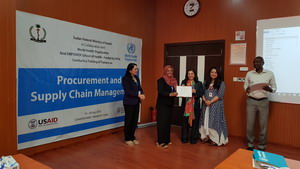 During the distribution of certificates workshop facilitator from EMPOWER Faculty, Dr Naeema Al Gasseer WHO Representative for Sudan, Ms Aziza Adam WHO logistics participant in the workshop, and Dr Mohira Boboeva WHO Emergency Technical Officer9 August 2018 – The World Health Organization (WHO), in collaboration with the Federal Ministry of Health and the Humanitarian Aid Commission conducted a training of trainers workshop in July on the procurement and supply chain management for 30 participants working in areas of conflict and natural disasters in Darfur, Kordofan, and the Blue Nile states.
During the distribution of certificates workshop facilitator from EMPOWER Faculty, Dr Naeema Al Gasseer WHO Representative for Sudan, Ms Aziza Adam WHO logistics participant in the workshop, and Dr Mohira Boboeva WHO Emergency Technical Officer9 August 2018 – The World Health Organization (WHO), in collaboration with the Federal Ministry of Health and the Humanitarian Aid Commission conducted a training of trainers workshop in July on the procurement and supply chain management for 30 participants working in areas of conflict and natural disasters in Darfur, Kordofan, and the Blue Nile states.
The shortage of essential and life-saving medicines in these states has led to high out-of-pocket expenditure for health, which is often unaffordable for the vulnerable population.
Although 69% of the country’s population has access to health services, the physical accessibility to primary health care facilities varies from 3039 people per facility in the Northern State to 20 779 people per facility in South Darfur according to Sudan’s Humanitarian Needs Overview for 2018.
The training witnessed participation of different level professionals, which included area coordinators, pharmacists, public health officers and WHO implementing partners. It aimed at equipping them with basic and modern techniques to procurement and supply chain management functions, as well as ensuring the quality of pharmaceutical products at the central warehousing and facility levels.
 Dr Naeema Al Gasseer, WHO Representative for Sudan, facilitates a session of the workshop“The 5-day training was tailored to apprise participants on the rational utilization, monitoring and dispensing of drugs. Integration of feedback from implementing partners was received regularly to address the challenges encountered in the field,” said EMPOWER faculty expert and training facilitator.
Dr Naeema Al Gasseer, WHO Representative for Sudan, facilitates a session of the workshop“The 5-day training was tailored to apprise participants on the rational utilization, monitoring and dispensing of drugs. Integration of feedback from implementing partners was received regularly to address the challenges encountered in the field,” said EMPOWER faculty expert and training facilitator.
Managing the shortage of medical supplies in Sudan is a key factor for the adequate health service delivery for affected communities in Darfur and Blue Nile, and more recently in South and West Kordofan states.
“We are going to facilitate a series of courses in our states and localities,” said Abdul Ghani Ahmed, a participant from the Blue Nile State. “We have been oriented for the first time on the international logistics practices, guidelines, and regulations for procuring and distributing safe medicines,” he added.
In 2017, Sudan developed a National Supply Chain Strategy that integrated the provision of procurement and supply chain services through a joint, Cost-sharing Implementation Plan for 2017- 2021. The central entity responsible for the operationalization of the National Supply Chain Strategy is the National Medical Supplies Fund in the Ministry of Health. This centre is legally responsible for the procurement and distribution of medicines, consumables and medical equipment to government institutions in Sudan’s 18 states.
Together with WHO and other international partners, the National Medical Supplies Fund has identified the need for sustained and deep investment in human resource capacity-building and strengthening, as a firm basis for achieving health-related outcomes.
“Meeting the demands of the health sector, based on the health challenges being faced, requires a continuous and sustained investment,” said Dr Murad Ahmed, a pharmacist participant from the Federal Ministry of Health in Khartoum. “We need to promote the capacity of PSM health workers to enable them to respond to these challenges effectively using the tools and resources available in health facilities and primary health care centers,” he added.
WHO’s support to the FMOH and field implementing partners running around 137 primary health facilities in Darfur, the Blue Nile and South Kordofan states was a result of the generous contribution from The United States Agency for International Development (USAID) and The Office of U.S. Foreign Disaster Assistance (OFDA) to ensure the availability of safe drugs in Sudan.



